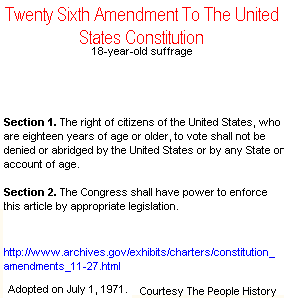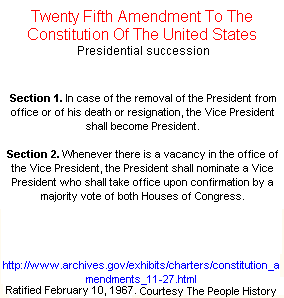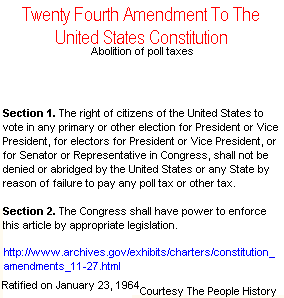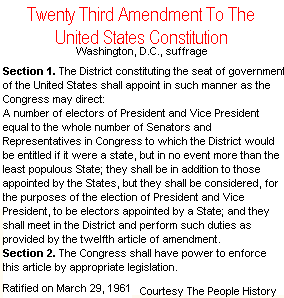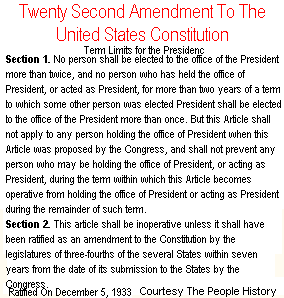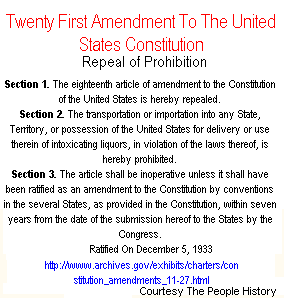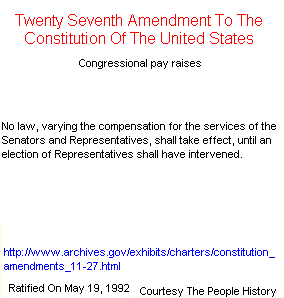
A simple, yet important amendment. Most people didn't give much thought about congressional pay raises...until they started to get raised quite often. This amendment put a stop to that, for the most part.
Video:
Again, simple, yet effective. Put in the form of a children's book (minus the title, I suppose).
Article:
06 January 2010
Story of 27th Amendment Shows Individual’s Power in a Democracy
Change to Constitution achieved through one citizen’s campaign for reform
Jianan Wang blogs about life in the United States on the Chinese-language blog “Wild Geese from Foggy Bottom.” The following article has been adapted from one of his entries.
Washington — Even in a country as large as the United States, one determined citizen can bring about change, even with a proposal that collected dust for nearly two centuries.
In the early days of the United States, the 1st Congress passed 12 proposed amendments to the U.S. Constitution but only 10 — later known as the Bill of Rights — were ratified by the states and became law, in 1791. One of the two amendments that failed in the 18th century to be ratified by the necessary three-fourths of the states eventually became the 27th Amendment through the efforts of an ordinary citizen 202 years later.
The amendment, which states “No law, varying the compensation for the services of the Senators and Representatives, shall take effect, until an election of Representatives shall have intervened,” is intended to serve as a restraint on the power of Congress to set its own salary — a power that has obvious potential for conflict of interest.
Early congresses showed almost no signs of acting as corrupt interest groups, so there was little incentive to revive the failed amendment. But in 1873, the 47th Congress passed an amendment to the general appropriations bill to double the annual salary of the president from $25,000 to $50,000 and increase its members’ salary by 50 percent, from $5,000 to $7,500 per year. The amendment made the increase retroactive to 1871 for congressional members, giving them two years of back pay. The great “Salary Grab,” as it was known, produced widespread public outrage and prompted Ohio to ratify the sleeping constitutional amendment on congressional compensation. Months later, Congress repealed the provision in an 1873 law that increased its members’ pay.
During the next 100 years, as the United States rose to become one of the world’s superpowers, congressional salaries kept pace with inflation and average wages in the country. But in the 1970s, the oil embargo of 1973 quadrupled oil prices and the U.S. gross domestic product (GDP) dropped 4.5 percent. Then, the 1979 Iran hostage crisis trigged another round of energy shortages, and four subsequent recessions (1970, 1973–75, 1980 and 1981–82) led to widespread unemployment and frozen wages in many occupations. Yet, during roughly the same period, annual salaries for those serving in Congress tripled, from $44,600 to $125,100, compared to a 7 percent increase in the median U.S. wage during the same period.
That sharp contrast led some U.S. citizens to begin a movement to revive the dormant congressional-compensation amendment. In 1978, the Wyoming Legislature ratified it.
ONE CONCERNED CITIZEN
In 1982, Gregory D. Watson, a college sophomore at the University of Texas, Austin, while researching the passed — but not ratified — Equal Rights Amendment (ERA) of the 1970s for his term paper, found the unratified 1789 congressional-compensation amendment and decided to change his paper’s topic. He argued that because the 1789 amendment had no time limit, states could still ratify it and the amendment could become law. Watson’s government professor was unimpressed and gave the paper a “C” grade, but Watson remained intrigued by his discovery.
At that time seven states had ratified the amendment, so Watson needed 31 more to achieve 38, or three-quarters of the 50 states. He began his advocacy efforts in states where both of the bodies of the state legislature were controlled by one political party. In 1983, he convinced the state of Maine to ratify the amendment, and he won ratification in Colorado the following year.
Watson’s campaign soon attracted a few famous names, including Paul Gann, a California-based conservative political activist; Ralph Nader, the Green Party presidential candidate; and a few members of Congress. Their support had little effect, but Watson persevered, working several jobs to fund his efforts and using his limited spare time to call and write to state legislators.
From 1985 to 1988, Watson helped win ratification by 18 more states, and came close to meeting his goal of completing the ratification process by the 200th anniversary of the amendment’s original passage by Congress.
Seven states ratified the amendment in 1989, two more in 1990, and one more in 1991. By the spring of 1992 several states were racing to become the 38th state and make it the law of the land. On May 5, 1992, Missouri and Alabama both ratified the amendment, followed by Michigan and New Jersey on May 7 and Illinois on May 12.
On May 18, 1992, the archivist of the United States, Don W. Wilson, announced the 27th Amendment had been ratified. On May 20, 1992, the Senate voted 99 to 0 to accept the ratification of the 27th Amendment, and the House of Representatives voted its acceptance 414 to 3.
In some ways, it is fair to say that Watson himself amended the Constitution. He was a concerned citizen who sincerely believed this amendment would improve the Constitution in just the manner that the 1st Congress had sought.
“The American people want a Congress that is honest, that has integrity. This amendment is one vehicle by which some degree of decorum can be restored,” Watson was quoted as saying in a New York Times article on May 8, 1992.
After the amendment was ratified, a reporter tracked down the professor who graded Watson’s paper and told her what Watson had achieved. The teacher apologized for giving him a “C,” but told him the grade could not be amended.
Reaction:
This is the true power in a democracy. The fact that one person with enough determination for a cause can literally be a catalyst for an amendment to our constitution is incredible. My hat is off to that guy
